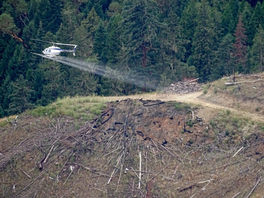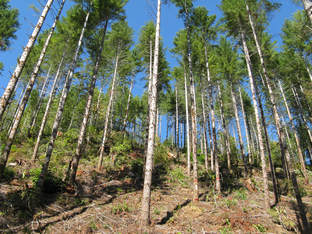Modernizing Oregon's Logging Laws

Despite propaganda from the Oregon Forest Resources Institute (OFRI) - a tax-funded public relations arm of the timber industry -telling Oregonians otherwise, the conservation measures in the law that governs private forest lands in Oregon are the weakest in the Pacific Northwest. Shortcomings of the law have led to environmental damage and human health concerns. Fortunately, alternatives do exist.
Oregon Wild is actively organizing with other environmental groups, our supporters, and communities all over the state, to achieve comprehensive reform of the Oregon Forest Practices Act. Reform can take several forms:
Legislative
In 2015 a strong coalition of Oregon legislators, working on behalf of rural residents and public environmental health interests, pursued legislation to increase public transparency and accountability around uses of aerial pesticide and herbicide spraying. Unfortunately the legislature produced a watered-down bill backed by the timber industry.
In 2017, Oregon Wild and many of our partners worked with legislators and community groups to introduce several ideas to the legislature that could dramatically improve forest and drinking water protections, and help people protect themselves from aerial spray. Again, the legislature failed to move even the most common-sense of reforms out of committee.
The 2019 legislative session will offer additional opportunities to seek reform.
Public initiative
After the legislature failed to act to limit aerial spraying in 2015, Oregon Wild and our partners started a public initiative for potential inclusion on the 2016 ballot. The proposed initiatives would have stopped aerial pesticide sprays in drinking watersheds and near homes and schools. Though we collected enough signatures for the initial step, the clearcutting industry managed to hold the initiatives up in court long enough to put off the effort for the time being.
Grassroots Efforts
The movement to reform Oregon’s weak logging and aerial spray laws is a truly grassroots effort, and organizers in the field (and in the forest!) are connecting with the residents of rural Oregon who are most directly impacted by clearcuts and chemical spray. For too long, the pleas of these communities have gone unheard in the halls of the Capitol Building as they seek the same water and air protections enjoyed by residents of Eugene and Portland. Read and listen to their stories here.
Oregon Wild is actively organizing with other environmental groups, our supporters, and communities all over the state, to achieve comprehensive reform of the Oregon Forest Practices Act. Reform can take several forms:
Legislative
In 2015 a strong coalition of Oregon legislators, working on behalf of rural residents and public environmental health interests, pursued legislation to increase public transparency and accountability around uses of aerial pesticide and herbicide spraying. Unfortunately the legislature produced a watered-down bill backed by the timber industry.
In 2017, Oregon Wild and many of our partners worked with legislators and community groups to introduce several ideas to the legislature that could dramatically improve forest and drinking water protections, and help people protect themselves from aerial spray. Again, the legislature failed to move even the most common-sense of reforms out of committee.
The 2019 legislative session will offer additional opportunities to seek reform.
Public initiative
After the legislature failed to act to limit aerial spraying in 2015, Oregon Wild and our partners started a public initiative for potential inclusion on the 2016 ballot. The proposed initiatives would have stopped aerial pesticide sprays in drinking watersheds and near homes and schools. Though we collected enough signatures for the initial step, the clearcutting industry managed to hold the initiatives up in court long enough to put off the effort for the time being.
Grassroots Efforts
The movement to reform Oregon’s weak logging and aerial spray laws is a truly grassroots effort, and organizers in the field (and in the forest!) are connecting with the residents of rural Oregon who are most directly impacted by clearcuts and chemical spray. For too long, the pleas of these communities have gone unheard in the halls of the Capitol Building as they seek the same water and air protections enjoyed by residents of Eugene and Portland. Read and listen to their stories here.
Alternatives to Clearcutting

Seeking change for a more sustainable future for Oregon's forests goes beyond modernizing Oregon's logging laws. It also means encouraging a more responsible form of forestry. Networks of practitioners and certification organizations exist to educate and encourage this alternative way of doing business. More info on these certifications can be found here.
Many Oregon foresters have committed to harvesting wood from their forests in a socially and ecologically responsible fashion. One example is Hyla Woods, but you can learn about more in this Eugene weekly article.
While we understand that timber companies have different priorities and goals for forest management than our National Forests, public forest lands can be a living example of a way of logging that has far fewer negative consequences for fish, wildlife, water, and carbon.
Many Oregon foresters have committed to harvesting wood from their forests in a socially and ecologically responsible fashion. One example is Hyla Woods, but you can learn about more in this Eugene weekly article.
While we understand that timber companies have different priorities and goals for forest management than our National Forests, public forest lands can be a living example of a way of logging that has far fewer negative consequences for fish, wildlife, water, and carbon.
